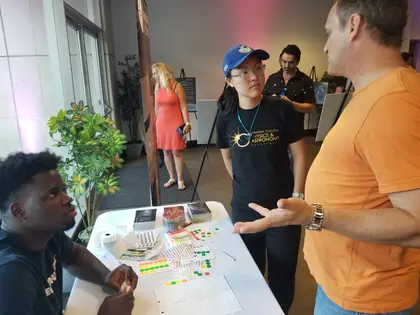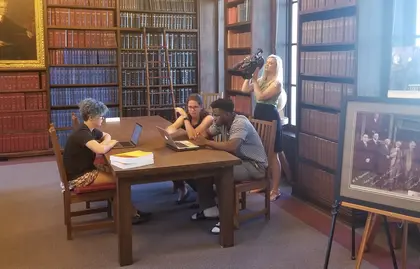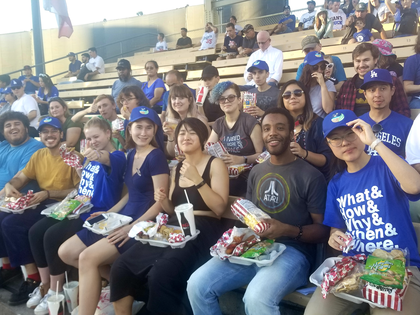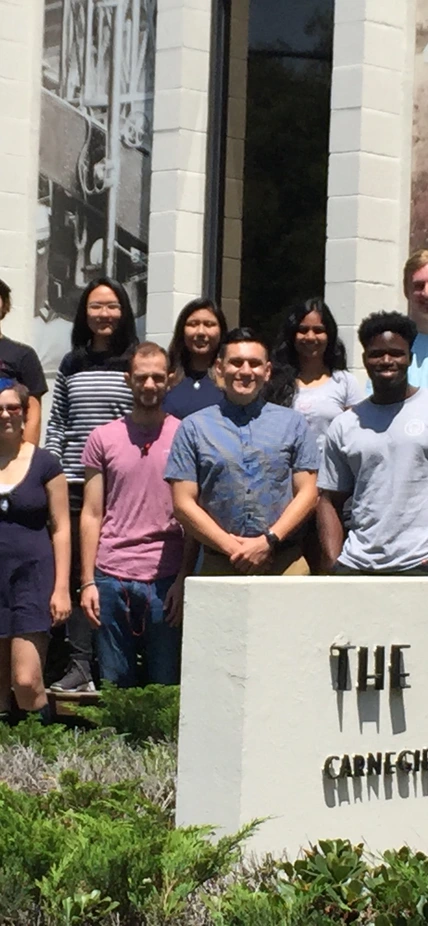Next month, most of the 2019 cohort of Observatories summer students will present posters of their work at the American Astronomical Society's 235th meeting. This will be an important culmination of one of the program's top goals—building the participants' science communications skills.
Over the summer, each student designed and conducted an original research project with mentorship from one or more Carnegie scientists. Their efforts spanned a huge variety of subjects from improving astronomers’ ability to detect exoplanets, to investigating the physics and chemistry of galaxies, to understanding the capabilities of a potential new component of an instrument for a telescope at our Las Campanas Observatory in Chile.

Sunny Rhoades, who returned for her second summer at Carnegie, said the most-valuable part of the experience was seeing how her mentors in the program approached and solved problems.
“This has helped me evaluate my conceptual understanding of the research I’m doing and see what I could do to improve,” she said of working on her project about how galaxies influence the surrounding intergalactic medium.
The summer student program is designed to prepare participants for success at school and in the future—regardless of whether they choose to pursue careers in academia or elsewhere.
“In a typical classroom, everything works. If something doesn't, you are doing it wrong. That's the expectation,” said instrumentation intern Pei Qin, who worked on characterizing a new type of fluoride fibers that can be used to transmit light in infrared wavelengths. “But research is a totally different beast where things tend to go in unexpected directions, not because you did something wrong, but because there are no right vs wrong answers anymore. And I think that is very important for young scientists like myself to know and embrace.”
In fact, multiple participants remarked on how seriously their mentors championed the program’s philosophical commitment to the importance of curiosity.
Emmanuel Durodola, who studied stellar variability in radial velocity measurements, said the most-important takeaway of his summer experience was “to never be afraid of asking questions.”

Although the atmosphere of the program is designed to be supportive, it is also an intensive experience. In addition to the students’ investigations, they participate in a rigorous series of workshops to build the technical and communications skills, culminating in end-of-summer presentations.
By the end of the summer the students gained the skills and confidences to be capable of discussing their work with their peers as well as with professional scientists or engineers and other members of the astronomical community. This will prepare them to attend the AAS meeting in January.
In addition to professional development discussions, the students also take trips to visit other scientific organizations, including the Jet Propulsion Laboratory and Mt. Wilson Observatory.
“This was a surreal experience for me because it was my first time looking through a telescope,” Durodola added.
Of course, the students had plenty of opportunities for recreation, too, including attending Carnegie’s annual night at Dodger Stadium in August, as well as participating in sharing astronomy with the public during outreach activities in Pasadena and Los Angeles.
“The most fun aspect of the program was hanging out with other summer students outside of work,” said Jake Helton, who worked on characterizing the physical conditions of galaxies 6 to 8 billion years ago.

Ricardo Flores, who used Type Ia supernovae to probe the properties of the Milky Way concurred. “I enjoy the events where it's just us hanging out and talking,” he said.
“We are so proud of the excellent work accomplished by our students over the summer and are confident that they will represent Carnegie proudly at the AAS,” said Carnegie Staff Astronomer and Program Director Gwen Rudie.
The summer program is funded in part by support from The Rose Hills Foundation and The Ralph M. Parsons Foundations.
